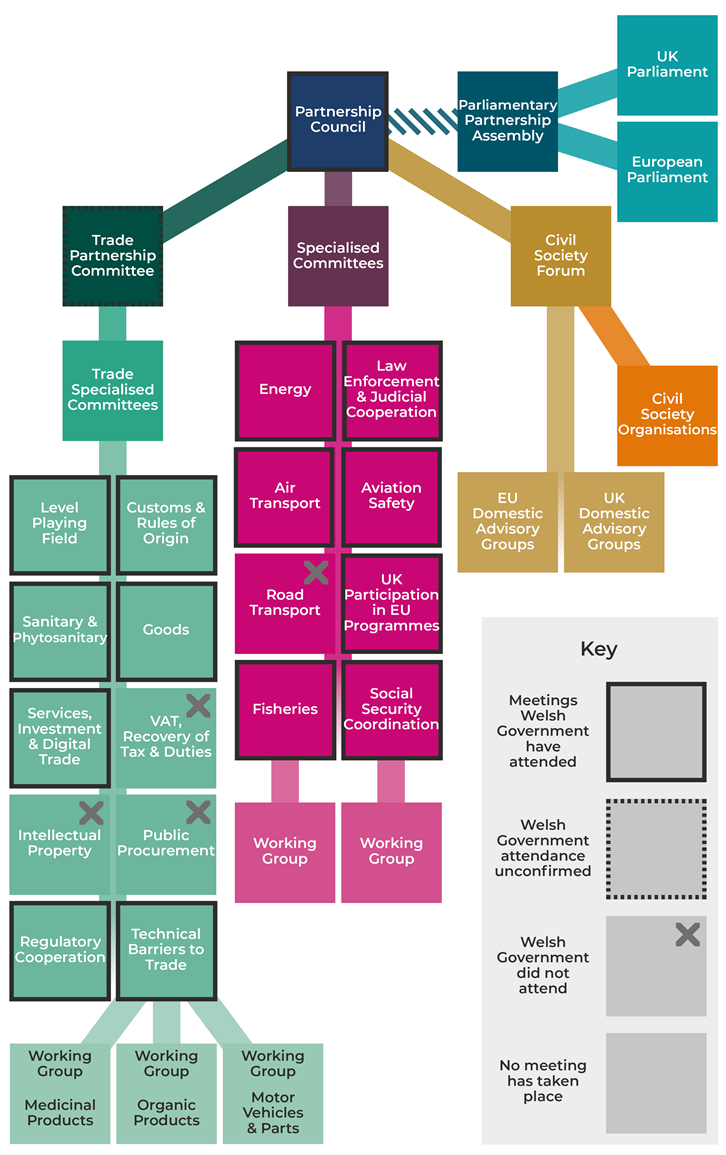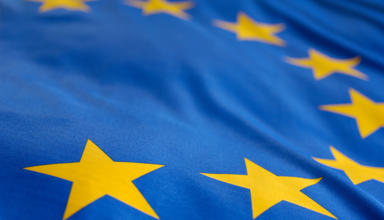UK-EU relations are primarily based on two agreements: the Withdrawal Agreement (WA), which governs the UK’s exit from the EU, and the Trade and Cooperation Agreement (TCA), which establishes their post-Brexit relationship.
Together, they create a complicated network of UK-EU meetings to discuss implementation of the agreements.
Decisions are made in over 30 forums. Some fall directly within devolved policy areas. Others don’t, but have a significant impact on devolved policy areas like economic development.
This article explains what we know so far about Welsh Government involvement in these forums. It follows our previous article, on how Wales is represented in UK-EU relations.
UK Government sets the arrangements
The First Minister has said that intergovernmental pre-meetings take place to discuss potential agenda items and UK positions on matters for discussion at TCA meetings.
The UK Government informed the devolved governments how they would be involved in UK-EU meetings in May 2021. They could attend meetings led by UK Government departments where items of devolved competence are on the agenda and assist in meeting preparation.
The Welsh Government has long pressed to be involved, particularly where meetings intersect with devolved areas. Ministers have criticised the post-Brexit arrangements because they can only attend some meetings as observers.
Welsh Government attends as an observer
The Welsh Government is not routinely invited to all meetings and its request to join others has been rejected.
Observer status, often granted to those with an interest in matters for discussion at international meetings, means Welsh Government participants can’t contribute to the discussion.
The Welsh Government is particularly unhappy with its observer status at the Partnership Council, the TCA’s oversight body. Both the Minister for the Economy, Vaughan Gething and the First Minister have requested they attend future meetings as full participants. The next meeting is expected in June 2022.
The UK Government rejected the First Minister’s request to attend the Withdrawal Agreement’s Joint Committee where matters relating to the Northern Ireland Protocol likely to affect Wales’ ports will be discussed.
The Welsh Government explains that it does have “a more active” role at the TCA’s committee on regulatory cooperation because it falls within devolved competence. This includes preparing materials and agendas, minutes and associated materials.
Who represents the Welsh Government?
At TCA meetings, the Welsh Government is represented by the Economy Minister, Vaughan Gething, whose portfolio includes trade and coordination of TCA matters. The First Minister attended UK-EU meetings during the Brexit negotiations and has Wales in Europe, international relations and intergovernmental relations in his portfolio.
Other Ministers also have EU-related matters in their portfolio, such as Minister for Social Justice, Jane Hutt, responsible for EU citizens’ rights under the Withdrawal Agreement, but the Welsh Government does not attend TCA meetings on this issue.
Former MEP, Derek Vaughan, has also been appointed as the Welsh Government’s new European representative to support its work in Europe, including engaging with politicians and officials at EU institutions and promoting the Welsh Government’s policy agenda in the EU.
What do the latest meetings tell us?
Our infographic shows the new UK-EU forums established by the TCA and whether the Welsh Government has attended.
UK-EU forums: Trade and Cooperation Agreement

The Welsh Ministers or their officials have attended most meetings, regardless of whether the subject is in a devolved or reserved area. The latest meetings covered fisheries, energy, participation in EU programmes, law enforcement, air transport and aviation safety.
However, they chose not to attend some meetings that cover Welsh Government responsibilities. The Minister for Finance and Local Government told the Senedd that it didn’t attend the meeting on procurement because “there were no items on the agenda which warranted attendance”. The agenda and minutes show that policy and legislative developments and implementation issues were discussed.
Officials from the Scottish Government, Northern Ireland Executive and Isle of Man Government attended meetings without the Welsh Government on road transport and VAT, recovery of tax and duties.
The Senedd wants more transparency
The Senedd’s Legislation, Justice and Constitution Committee (“the Committee”) has noted the challenge of navigating the new system and wants more transparency.
In January, the First Minister set out how the Welsh Government would keep the Senedd informed of its involvement at UK-EU meetings, by:
- directing Senedd Members to the European Commission’s website to obtain information on UK-EU meetings;
- promising to continue issuing written statements following meetings of the Partnership Council; and by
- updating the Senedd on meetings of the new Inter-Ministerial Group (IMG) on UK-EU relations.
Use the drop-downs menus below to find out more:
The European Commission website holds the most detail on UK-EU meetings in one place. Some documents list attendee information. The Welsh Government does not publish information relating to its attendance and the Senedd relies primarily on written ministerial statements, exchanges with individual ministers and the European Commission’s website for information.
The Partnership Council is required to meet at least annually, or sooner on request from the UK or EU. The Council is able to take decisions in writing between meetings but it is not clear what role, if any, the devolved governments have in this.
Vaughan Gething missed the first meeting of the IMG on UK-EU relations because it was called with two hours’ notice, which he described as “unacceptable”. A senior Welsh Government official attended as an observer alongside Ministers from Scotland and Northern Ireland.
In March, the First Minister told the Committee that the four governments would use the IMG to “press further” for full status at the Partnership Council. On 20 April, the Counsel General suggested that it should aim to meet regularly, including before meetings of the Partnership Council and the Withdrawal Agreement’s Joint Committee.
First Minister asked to reconsider how information is provided
The Committee welcomed the First Minister’s intention to continue issuing written ministerial statements following meetings of the Partnership Council. However, it said that it was “disappointed” with his response and requested he:
consider a proportionate but more transparent mechanism for informing the Senedd of Welsh Government attendance at these meetings, the issues discussed and the points made by the Welsh Government in representing Welsh interests.
It also recommended that all four governments collectively consider concerns regarding a lack of transparency in TCA structures.
The First Minister responded on 10 March, stating that he is:
- committed to providing information proactively on intergovernmental meetings;
- happy to explore how more information on the government’s involvement in TCA structures can be provided; and
- suggests a meeting between the Senedd and Welsh Government officials.
What next?
Navigating the complex maze of decision-making discussed here is a new challenge for all UK parliaments.
The Legislation, Justice and Constitution Committee’s work informs the wider Senedd of Wales’ representation at UK-EU meetings, which it describes as being of “considerable importance and interest” to stakeholders.
The post-Brexit UK-EU relationship affects everyday life here in Wales and will continue to do so for many years to come.
Article by Sara Moran, Joe Wilkes and Božo Lugonja, Senedd Research, Welsh Parliament






